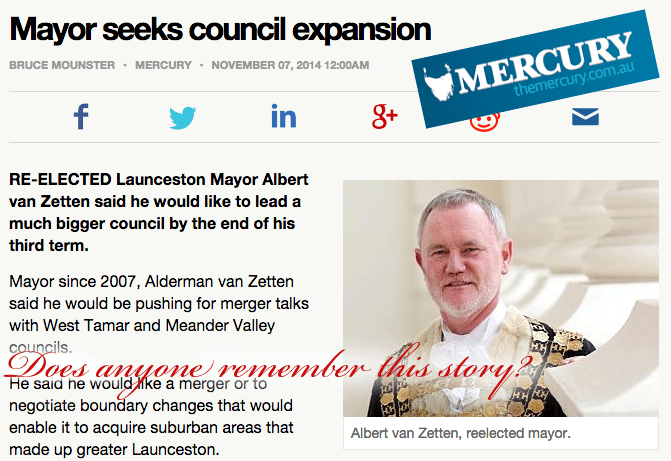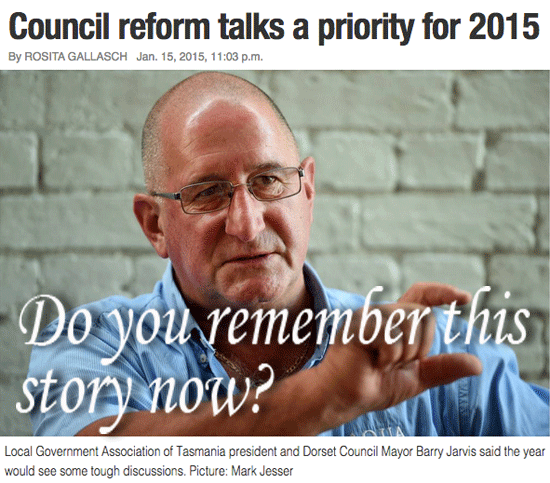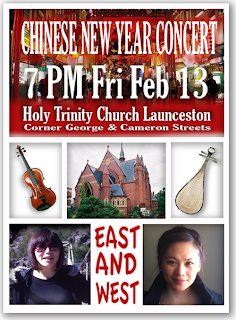 |
|
Councils ... IT IS very interesting to see an Alderman speaking out on council amalgamations in The Examiner.
Alderman Ted Sands makes an excellent case for proactive council amalgamations and the evidence he presents is rather compelling.
Realistically, Tasmania doesn’t need more than one local government ‘council’ but how that might look demands close community engagement.
In truth, however, it may be a bridge too far to go to a single council for Tasmania’s 500,000 people, albeit that it works well elsewhere.
Consequently, consideration probably needs to be given to say just five, mirroring the current state and federal electorates.
The fiscal savings to be made, and the social advantages to be won, from a radical reimagination of local government are enormous.
There is no imperative to have the three tiers of government structured and administered precisely as Tasmania currently does.
However, getting councilors and aldermen, general managers and so on to see the benefits relative to their constituencies will be more than difficult.
Their losses will be their constituents’ wins and gains.
No matter what, there will be plenty of work for the efficient, effective and accountable representatives and administrators.
In the meantime the state government could put all of Tasmania’s councils into administration and build from there.
— RAY NORMAN, Trevallyn
Amalgamation 18/02/15 ... HERE we go again having inane conversations about amalgamation.
It will never happen unless the Local Government Minister Peter Gutwein exercises his authority to bring about change.
The 29 mayors and 200 plus councillors and aldermen will do everything to prevent this from happening (except some).
Victoria went from 274 councils to 78 or thereabouts, they simply got in with the job of streamlining local government.
Jeff Kennett is to be applauded for having the courage and will to force change.
Will it happen here?
No, because the government is protecting the leather seats they sit on, it is politically unpalatable for a government to do so in this state.
Where to from here?
We will have these 'conversations' that will go nowhere and at the end of the day the general comment will be something like, "Oh well we tried, but we could not general consensus”.
Think about this, in the Northern region; eight councils, eight general managers, total salaries about $2 million.
Then you have all the duplication of engineers, finance directors, governance directors and so it goes on.
Millions of dollars frittered away simply because no one will make a decision.
— TED SANDS, Launceston City Council alderman.
Council amalgamation Nov. 10, 2014 ... THE current debate re council amalgamation is no simple affair.
See your ad here
May I suggest the debate moves from council amalgamation to council reform. Local government administration is a business and no Tasmanian business can afford 29 branch offices.
Even wealthy banks can't.
The problems that are inherent within local government can't be fixed by simply joining neighbouring municipalities.
Our small state must capitalise on all assets and resources, and this requires critical restructuring of the whole of local government enterprise including management, representation, purpose and responsibilities.
Many councils are unsustainable with their boundaries established in previous centuries.
We should begin reform with a blank map of the state, initiate proper consultation facilitated on proven business models and establish viable areas of local governance respecting the lifestyle and business needs of all stakeholders.
More state and federal funds will be required to meet the replacement of ageing infrastructure and the extra responsibilities of local government from its original purpose, thus making the need for reform on the basis of a whole state approach critical rather than just tweaking at the edges.
— GRAEME NEILSEN, George Town.
Mergers on the table By CHRIS CLARKE Nov. 29, 2014, .... MAYORS and council general managers will meet in early February to discuss the possibility of local government amalgamation. Statistics revealed by the Australian Property Council last week showed that three in four Tasmanians — out of 1000 surveyed — were for the amalgamation of councils. Seventy-four per cent of people said 29 councils were too many for a state population of 510,000. Similarly, 74 per cent of people said 263 councillors and aldermen were too many for the state’s population. Seventy-four per cent of people agreed that councils would save money if they were to merge. Following the result, Local Government Minister Peter Gutwein yesterday announced the state government’s intentions to take the discussion forward. ‘‘We know from informal discussions that there is an appetite for structural reform in local government to deliver improved services to communities,’’ he said. The Treasurer believes distinct guidelines need to be followed if a voluntary reform is to succeed, however. ‘‘Amalgamations must be in the interest of ratepayers, improve the level of services for communities, preserve and maintain local representation and ensure that the financial status of the entities is strengthened,’’ he said. See your ad here Australian Property Council Tasmanian executive director Brian Wightman believes that a fear of job losses is preventing the amalgamation from happening. ‘‘You’re basically asking local government to reform itself,’’ he said. ‘‘What actually will occur is that positions will reduce, which is a concern to those still in those positions. It seems to be very heavily supported by the public, but when it comes to political will it’s very difficult.’’ Mr Wightman said he hoped a decision on local government amalgamation would be reached by the 2018 council and state elections. Local Government Association of Tasmania president Barry Jarvis said he supported any discussion of an amalgamation, both as LGAT president and Dorset Mayor. ‘‘We (Dorset) are vulnerable (to amalgamation) due our huge reliance on grants,’’ he said. ‘‘I’ve always said that. Fifty per cent of our funds come from grants and 50 per cent comes from ratepayers. If there’s any change in that, it means we have to go back to the ratepayers and ask for more, and we just can’t do that. ‘‘It’s very interesting times. But it doesn’t really surprise me.’’
Time to merge July 7, 2014, ... IT WAS indeed refreshing to read Brighton Mayor Tony Foster's comments and his thoughts on the very subject that causes many in local government to run for cover and remain in denial.
See your ad here
Tasmania is overrun by local government - 29 mayors, 29 general managers, 29 senior engineers and the list goes on.
Until we, as local government members stand up and demand that the Minister for Local Government instigate change by way of amalgamation as soon as possible then nothing will change.
Cr Foster's words that both sides were "gutless" is totally correct.
Too many mayors are hiding behind the mantra of "losing identity" instead of being honest and saying "I need to protect my patch forever against incursion, I need to protect my fiefdom at all costs against those who want change, that is the harsh reality".
The government will not change the status quo, because it is simply politically unpalatable to do so.
We lack leadership in government, and we lack the fortitude within local government to insist on change.
- TED SANDS, Alderman, Launceston City Council.
Amalgamation
May 28, 2014, ... IT is truly amazing to read the comments on amalgamation (The Examiner, May 22) from the former minister for local government Jim Cox. Unfortunately, I believe there was a lack of passion to drive home the need to rationalise the 29 councils in this state. If you do not succeed the first time, then try again to convince your cabinet colleagues that this needs to happen, it is called leadership and believing in what you are hoping to achieve. Unfortunately there is one underlying root cause that determines the outcome, and that is political survival by individuals. The amalgamation discussions last came to a head in 1998, since then there has been no positive action by any local government minister to overhaul local government. The current Minister for Local Government needs to stand up and make the executive decision and bring about the change, waiting for local government to initiate same is foolhardy in the extreme. Millions of dollars are frittered away as illustrated in Matt Maloney’s column (The Examiner, May 23) through the duplication of highly paid executive salaries across many councils, which in my view, is wasteful in the extreme.
— ALDERMAN TED SANDS, Launceston City Council
Council amalgamation Nov. 11, 2014, ... A GREAT deal of media coverage has been given to the fact that Tasmania is over-governed (both at state and local level) in relation to the size of our population.
See your ad here
To date while there has been discussion on reducing the number of state public servants, a reduction in the local government sector has not been addressed.
Residents in Launceston for example are administered by three different councils, each with their own administrative bodies and infrastructure.
Surely one council could easily handle the relatively small population of the greater Launceston and Tamar regions.
If the matter of council amalgamation is left to individual councils to manage, vested interest will ensure it never happens.
The state government needs to manage the process to decrease local government cost and improve efficiency by directing a series of amalgamations based on logical geographical criteria.
To ensure this is a popular move, the savings should be passed back to ratepayers in the form of reduced rates and to commence the process a study on what long term savings could be possible should be commenced immediately.
— M. CAMPBELL-SMITH, Launceston.
Burr slams `amalgamation agenda' By PETER SANDERS Nov. 28, ... THE Launceston City Council and The Examiner were heavily criticised at last week's Dorset Council meeting.
See your ad here
Scottsdale resident and former Lyons Liberal MHR and West Tamar Council Mayor Max Burr accused the newspaper and the council of running an amalgamation agenda that would benefit Launceston to the detriment of smaller, neighbouring councils.
Cr Burr gave an impassioned address in the time allotted for public deputations.
``I understand that the current inquiry into local government will look at two things - the number of elected members on each council and the amalgamation issue that has been floated in the press for some time,'' Cr Burr said.
``In relation to the number of elected members, I consider the minimum number to be nine, given the number of councillors appointed to numerous community boards and bodies - there also has to be a sufficient number of councillors to form an effective council committee system.
``In relation to the amalgamation issue, I have been appalled by the campaign that's been conducted by The Examiner Newspaper.
``In my view (its) campaign has been nothing more than a campaign to try and make Launceston a larger and more influential council.
``It gives no thought at all to the smaller councils or the country councils.''
Strengthening Northern Tasmania Development was another thing that would help to improve the efficiency of councils in the North, Cr Burr said.
``NTD has been disgracefully undermined by the Launceston City Council in the past for their own self-interest,'' he said.
See your ad here
Launceston City Council Mayor Albert van Zetten said that he did not wish to comment on the debates that took place around other council tables.
``But from my perspective as Launceston Mayor, I do like to see discussion of the amalgamation and reform issues,'' Alderman van Zetten said.
``At times, I expect it will be a heated discussion, which is fine.
``They are complex issues, but I don't think councils should be afraid of exploring them - it should all be on the table, because we want to hear what the public has to say.
``At the end of the day, they are who we represent.''
Amalgamations April 9, 2013, .... AMALGAMATION wouldn’t necessarily mean rates drop but it would mean that you got more value for your dollar in terms of economy of scale and no doubling and tripling up of elected or staff positions. For some time I have been advocating a Northern council comprised of Launceston, Meander Valley and West Tamar with areas of the Northern Midlands and George Town councils as well. The council area would have an airport, a seaport and approximately 140,000 people with one mayor, 10 councillors and one general manager, as opposed to the current situation of five mayors, 45 councillors and five general managers. The huge majority of the people in this area rely on Launceston for their education, their work, their recreation, their services, venue use for sport and culture, refuse disposal and the like, so it’s a seamless transition. Councils in other states this size work very well and ratepayers get more value for money because there isn’t unnecessary duplication. — ROB SOWARD, Launceston City Council alderman
City boss slams amalgamation report By PATRICK BILLINGS July 19, 2012, ... LAUNCESTON City Council general manager Robert Dobrzynski has launched a scathing attack on a local government report discouraging amalgamations, recommending aldermen ``reject '' it at Monday's meeting.
The report by Professor Brian Dollery recommends councils should share services instead of merging, arguing amalgamations almost always fail to deliver lower rates and charges.
The report was commissioned by Northern Tasmanian Development, an organisation consisting of the eight northern councils of which Launceston City Council is the biggest financial backer.
Mr Dobrzynski said the report ignored the reality of local government in the North including what he described as the major impediments to Launceston's economic development under multiple councils.
``This alone is a damning indictment on the inadequacies of the report,'' he said.
``The report appears to be little more than a cut and paste by the author from previous work . . . it pursues his penchant for broad-scale resource sharing as the panacea to all the ills of the current anachronistic 20th century local government framework in Northern Tasmania. ''
Professor Dollery told this month's Local Government Association of Tasmania conference that resource sharing would only lead to modest savings, if any, and real reform must include guaranteed funding streams from the state or federal governments.
But Mr Dobrzynski said the report had achieved its ``purpose of ensuring that no meaningful reform occurs''.
Mr Dobrzynski said the report would ``provide succour to those councils within the region seeking to assume the ostrich position to do nothing, conveniently avoiding the reality of the state and region's circumstances''.
See your ad here
Mr Dobrzynski said it was astounding that the report did not mention the ``inequity of 65,000 rate payers within the Launceston City Council area continuing to fund . . . facilities enjoyed by 106,000 people'' in the city and more in the region.
He also accused Professor Dollery of highlighting failed forced mergers when there were more successful endeavours in Victoria and New Zealand.
Councils should be halved: Cox By BREAKING NEWS By BARRY PRISMALL March 20, 2011 ... FORMER local government minister Jim Cox believes Tasmania should have no more than 15 councils, if someone had the courage to do it.
A veteran local government minister of five years, Mr Cox said he tried to push for amalgamation, and in private discussion with councillors he had some encouragement.
He is the second former Labor government minister to call for the number of councils to be cut.
"I would think you could comfortably halve the current number (29). I had some work done on modelling," Mr Cox said.
"At one meeting a councillor said to me `but a lot of people in our region read different newspapers and drink different beer'. I just sat there and cried for 15 minutes," Mr Cox said.
"At least look at it. The reality is they won't be sustainable in the future. The 29 councils we have are far too many, but it was Labor Party policy that we not enforce amalgamation on them.
"Amalgamation is inevitable. It only needs the courage of someone to do it.
"There will be forced amalgamation ultimately, and they (councils) won't like it. Resource sharing and power sharing is not the answer. In the end you still have 29 councils and the same number of staff.
"You have to sit down and look at the benefits. It is better to have one body to represent a region, rather than individual councils. You could still have representation of local areas through the old ward system."
See your ad here
Outgoing Derwent MLC and treasurer Michael Aird last Thursday said Tasmania had too many councils and called for compulsory voting to be introduced to council elections.
"Local government needs to change to ensure it continues to be relevant in the future and delivers services at a reasonable cost," Mr Aird said.
Local Government Association of Tasmania president Barry Easther yesterday said Mr Cox tried to push amalgamation, but there were never meetings held for the purpose of debating amalgamation..
"You have to identify the problem and if there would be savings in reducing the number. If there would be benefits in amalgamation you have to identify them and look
at them, but you won't get savings out of a few less staff," Mr Easther said.
He said former premier David Bartlett presided at a local government council forum to look at various reforms, but ultimately the plan was abandoned because of costs.
Mr Cox said the councils that have looked at amalgamation include Break O'Day, Glamorgan-Spring Bay, Sorell Council, Dorset, Waratah- Wynyard, George Town and West Tamar.
"People like (Glamorgan-Spring Bay) Mayor Bertrand Cadart and (Break O'Day Council) Mayor Robert Legge - they had the courage to look at it," Mr Cox said.




















